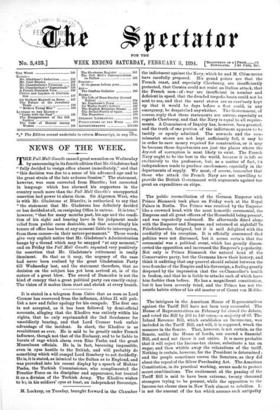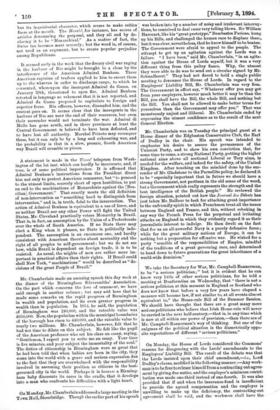The intrigues in the American House of Representatives against the
Tariff Bill have not been very successful. The Home of Representatives on February 1st closed the debate, and voted the Bill by 203 to 140 votes,—a majority of 63. The Inland Revenue Bill, which establishes an Income-tax, was included in the Tariff Bill, and will, it is supposed, wreck the measure in the Senate. That, however, is not certain, as the Senate, unlike the House of Lords, can amend a financial Bill, and need not throw it out entire. It is more probable that it will reject the Income-tax clause, substitute a tax on sugar, and then whittle away the relaxations of the tariff. Nothing is certain, however, for the President is determined ; and the people sometimes coerce the Senators, as they did about the repeal of the Silver Purchasing Act. The American Constitution, in its practical working, seems made to protect secret combinations. The excitement at the passing of the Tariff Bill is said to have been extreme, twenty thousand strangers trying to be present, while the opposition to the Income-tax clause rises in New York almost to rebellion.
is not the amount of the tax which arouses such antipathy but its inquisitorial character, which seems to make critics foam at the month. The Herald, for instance, has scores of articles denouncing the proposal, and they all end by de- claring it to be "Monarchical." As a matter of fact, the Swiss tax incomes most severely; but the word is, of course, not used as an argument, but to create popular prejudice among Republicans.



































 Previous page
Previous page